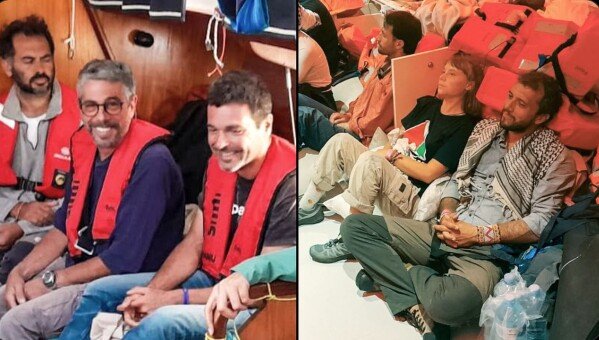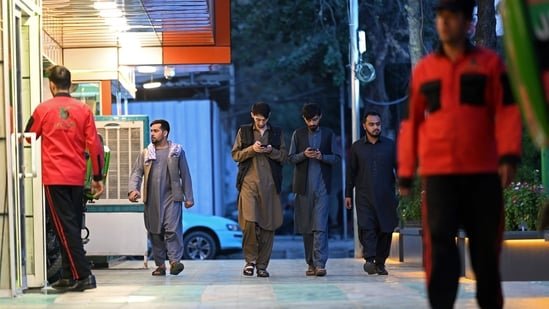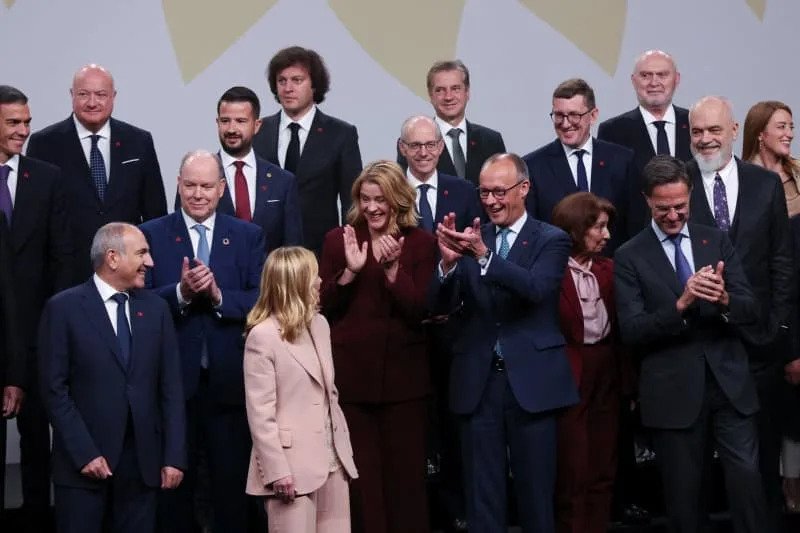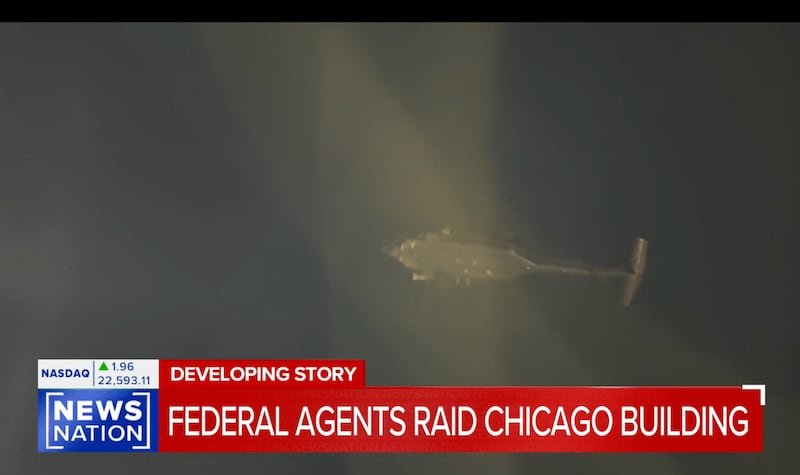Source: Kanal13 on YouTube
The glow that lit up the central Russian sky on Wednesday was not the usual rose-fingered dawn. The Yaroslavl oil refinery, Russia’s oldest and fifth largest, went up in flames just before 6.30am local time.
The regional governor immediately denied that it had anything to do with Ukrainian drones, blaming the blaze on a technical fault. That is always possible.
But the wider truth is that two months of Ukrainian strikes on Russia’s refining sector has produced a crisis at the pump. At least 16 out of Russia’s 38 refineries have been hit since the start of August, with strikes so regular that refinery “bingo cards” have appeared online to chart the destruction. Some refineries have even been fitted with nets, akin to the improvised protections fitted on Russian tanks and Ukrainian front-line roads, to shield them from drones.
Matters are about to get even worse for Russia. The Trump administration has now said that for the first time it will provide intelligence to help Ukraine hit energy infrastructure far inside Russia. America may even go as far as providing the long-range missiles – with a range of up to 1,500 miles – to do the job.
Even before America’s intervention, wholesale petrol prices had surged 50 per cent since January to a record high of 64.11 Russian rubles (almost 60p) per litre. And the fire in Yaroslavl will only make prices worse.
“It is serious,” says Tatiana Mitrova, research fellow at the centre on global energy policy at Columbia University. “Russian press reports that 38 per cent of primary refinery processing capacities are idle. This is a big number. You have to keep in mind Russia does have excess capacity for production of about 20 per cent, so around 40 per cent idle means a 20 per cent deficit,” she adds.
About 70 per cent of that idle capacity – around 236,000 tonnes per day – is down to Ukrainian drone strikes, according to the RBC business daily.
Occupied Crimea is suffering most, with at least half of the peninsula’s petrol stations running dry despite emergency rationing rules. Sergey Aksyonov, the head of the region, has had to appeal publicly for “patience”. On Wednesday, he cut the ration from 30 to 20 litres per person.
In the far east, the south and the Volga republics, authorities have reported 20 per cent deficits. Many local authorities have imposed a limit of 30 litres or even less per customer. Queues more than a mile long were reported at petrol stations on the M12 highway between Kazan to Moscow on Wednesday.
Even in Moscow and St Petersburg, some petrol stations have imposed limits of 60 litres and some drivers have reported the disappearance of 95 octane fuel, Russia’s standard retail grade of petrol.
Lukoil, Russia’s second largest producer, has banned the use of jerry cans at its stations to pre-empt panic buying in the capital.

In anticipation of panic buying, Lukoil has banned the use of jerry cans at its stations – AFP/Getty
The cause
Part of this is down to structural industrial weakness.
“We saw fuel crises in 2019 and 2013, before the war, before the sanctions, before everything. So it’s kind of an intrinsic quality of the Russian refining industry,” says Alexander Kolyandr, senior fellow with the Democratic Resilience Program at the Centre for European Policy Analysis.
But Ukraine has pressed on a bruise, he adds. “The [crisis] was amplified a lot by a very smart strategy of Ukrainian attacks.
“Unlike in 2024 when the Ukrainians started to bomb the refineries in April, this time they started in August, which is the peak demand season [due to holidays and harvest]. “Secondly, they managed to keep those attacks at such a level that the refineries are unable to repair all the damage and come back to 100 per cent output quickly.”
Demand was even higher than usual this summer because frequent airport shutdowns caused by Ukrainian drone raids meant that more Russians opted to drive rather than fly south, which partly explains why shortages have been so acute in the holiday hotspots of Rostov and Krasnodar.
The Ukrainians also just seem to be scoring more hits.
Refinery raids now consist of multiple drones flying in several waves to overwhelm air defences, making it difficult to start firefighting and repairs. A direct hit on a refinery’s furnace can put the entire facility out of action for months. Sanctions mean that it is much more difficult to procure spare parts for repairs.
The result, says Kolyandr, is “a perfect storm of declining production and increasing demand, and the unwillingness of the government to let the market set the price”.

Smoke and fire is seen above Kuybyshevskiy Oil Refinery in Russia’s Samara region following a Ukrainian drone strike.
The effect
This is important. The strikes are unlikely immediately to affect the war effort: supplies for the armed forces, whose tanks mostly run on diesel anyway, will be prioritised above all. Agriculture will also benefit from government support – the Kremlin has used export bans in summer to cover the harvest in the past.
But Putin is sensitive to the war in Ukraine impacting everyday life in Russia. The refinery strikes have forced Russia’s government to admit that Ukrainian drone attacks are effective, and will cause grumbling among the ordinary Russians trying to find petrol to get to work in the morning. Undoubtedly, it is ordinary consumers who are suffering most.
And it adds to a growing economic burden.
A combination of falling oil revenues and massive war spending are fuelling a record budget deficit that the Russian finance ministry projects will hit 2.6 per cent of GDP by the end of the year, up from an initial forecast of 0.5 per cent.
The government is proposing raising VAT from 20 to 22 per cent to cover the gap. Meanwhile, growth overall is anaemic, with the finance ministry revising down its forecast for GDP growth this year from 2.5 per cent to just 1 per cent.
Andrey Klepach, the chief economist at state-owned investment bank VEB, has said the economy contracted in the first two quarters of 2025, meaning that Russia is already in a technical recession.
Putin’s response
On Tuesday, Russia extended a ban on the export of petrol until the end of the year. It is considering a ban on diesel exports for non-producers, lifting import duties to allow petroleum to be brought in from China, Singapore and South Korea, and has begun sending more crude to be refined in Belarus, which is unaffected by Ukrainian attacks. It may also temporarily lift a ban on methylaniline, an additive that raises octane levels in fuel but which carries significant health risks.
And with the harvest coming to an end and the summer holidays over, demand will fall off anyway. Taken together, pressure at the pump (and knock-on inflationary effects) will ease.
Deputy prime minister Alexander Novak claimed last week that most regions are covered by sufficient reserves, but admitted that “overall, the balance for both September and October is a difficult one”.

Russia’s deputy PM, Alexander Novak, has said the balance of petrol reserves ‘for both September and October is a difficult one’ – Evgenia Novozhenina/Reuters
None of this necessarily implies street protests, unrest or the fall of the regime – let alone forcing Putin to end the war. After all, Ukrainians did not surrender when Russia tried the same tactic against their own fuel supplies in the spring of 2022.
But hitting refineries, pipelines and power stations is part of a new energy front to deprive Putin of cash from oil which helps finance his war. And taken with other wartime annoyances such as regular mobile internet shutdowns (to combat attacks by drones which use mobile signals to navigate), it will force the Kremlin to admit that it cannot shield the public from the conflict it started.
That could be critical. While accurately gauging opinion is hard, some polls suggest the more than 80 per cent of Russians want the Kremlin to focus on home affairs, and more than 60 per cent back peace talks to end the war.
In that sense, the refinery bombing campaign mirrors Russia’s own strikes on Ukraine’s energy and economic infrastructure: with no sign of breakthrough on the battlefield, both sides are targeting each other’s Home Fronts in the hope of forcing the other to give up the fight. The difference being that while every Ukrainian knows they are engaged in a battle of national survival, Vladimir Putin implicitly promised his people at home that there would be no direct impact on them from the war.
Airport disruption, phones and petrol shortages: it is all part of a campaign to bring home to ordinary Russians that the war is no longer “over there”.







